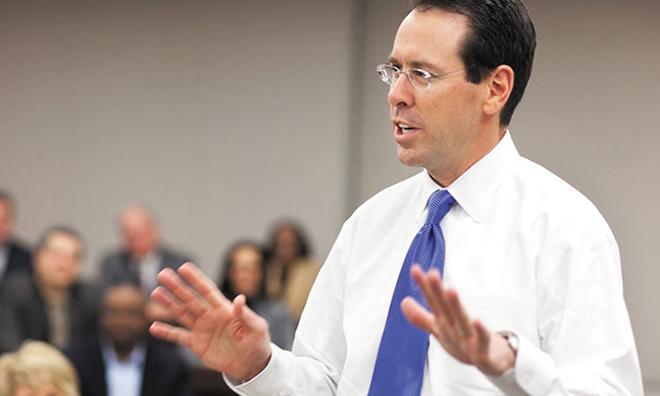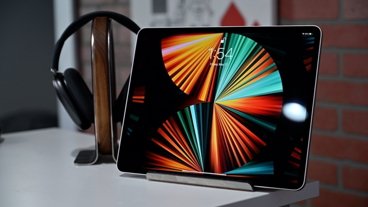During an investor conference on Tuesday, AT&T chief Randall Stephenson said wireless carriers need to push toward an ecosystem devoid of subsidies for high-end smartphones, a tack to which T-Mobile is already committed, as evidenced by a no money down iPhone offer for the holidays.
With smartphone penetration at 75 percent in the U.S., Stephenson told conference attendees carriers can no longer foot subscribers' bills for new smartphone hardware, reports CNET. Instead, a new focus must be directed at getting existing customers to more effectively make use of built-out networks.
Stephenson is suggesting AT&T, and other telecoms, must break customers of the very habits they helped create with 18-month handset subsidies meant to incentivize subscriber growth.
"When you're growing the business initially, you have to do aggressive device subsidies to get people on the network," Stephenson said. "But as you approach 90 percent penetration, you move into maintenance mode. That means more device upgrades. And the model has to change. You can't afford to subsidize devices like that.""[...] the model has to change. You can't afford to subsidize devices like that." - AT&T CEO Randall Stephenson
Before Apple's iPhone and the smartphone boom, wireless telecoms were more concerned with luring subscribers onto their respective networks than anticipating how those customers would utilize — and how best to monetize — said assets. Now, with billions of dollars' worth of infrastructure in place, and an approaching critical mass of smartphones in operation, the goal has apparently changed.
When the iPhone launched in 2007, AT&T was one of the first to leverage data-hungry smartphones as a subscriber driver with unlimited data plans offered through its 3G network, setting a standard for other U.S. carriers to follow. In 2010, the nation's No. 2 wireless provider ended the unlimited data scheme and moved to a tiered model.
At a conference in 2012, Stephenson expressed regret for introducing the all-you-can-eat option, alluding that company profits would have been much higher otherwise. The telecom has been pushing in the opposite direction ever since with the introduction of new pricing structures, throttling data speeds for grandfathered-in unlimited data plans and other tactics.
Last week, AT&T took another step toward separating itself from subsidizing devices by announcing a new discount for contract-free customers and those who choose to keep their older handsets instead of upgrading. On average, the incentive cuts about $15 off monthly data bills.
Despite early missteps, AT&T has successfully moved more than 70 percent of its customer base to consumption-based plans, a number Stephenson plans to grow going forward. The company's new "Next" initiative is a more sustainable route to increase smartphone penetration, he said.
Under the plan, customers can purchase a new handset with no money down and pay a monthly fee for 20 months as part of their wireless bill. The handset can be traded in after one year for an upgrade to newer hardware, at which point a new 20-month cycle starts based on the price of the device.Stephenson sees the new market dynamics as a chance for carriers to compete "down market."
"If you are a customer and you don't need to upgrade your device, you can get unlimited talk and text and access to the data network for $45 all-in," Stephenson said. "You can use your own device or finance it. I think this will be very powerful. It's where we see the market going."
With the pricing structure changes, Stephenson said AT&T and other telecoms will be able to compete "down market."
"You will see us go very aggressively in the prepaid market," he said, likely referring to AT&T's recent acquisition of prepaid carrier Leap Wireless.
While Stephenson talks up change, T-Mobile is well into its own experiment with the "uncarrier" initiative.
Also on Tuesday, T-Mobile announced it would be dropping down payments for Apple's new iPhone 5s and iPhone 5c handsets, as well as certain iPad models, for "well qualified" new and existing customers.
The limited-time offer includes 16GB versions of the iPhone 5s, iPhone 5c, iPad Air, non-Retina iPad mini and iPad mini with Retina display. Subsequent monthly payments will continue as usual, with device cost spread across 24 equal monthly payments.
The no down payment promotion is applicable to T-Mobile's Simple Choice Plan for all devices, while iPhone customers can take advantage of the JUMP! program, which allows customers to upgrade their phones up to twice a year for an additional $10 per month.
T-Mobile previously eliminated down payments earlier this year as part of its "$0 Down" sale, which ended for the iPhone 5 and 4S in August. The fourth-largest U.S. carrier later offered the iPhone 5s and 5c for zero down when the devices launched in September.
 Mikey Campbell
Mikey Campbell









-m.jpg)






 Malcolm Owen
Malcolm Owen
 Amber Neely
Amber Neely


 Christine McKee
Christine McKee

 Chip Loder
Chip Loder
 Marko Zivkovic
Marko Zivkovic









97 Comments
Bla, makes me sick to think that some of the money I pay to ATT goes into this guy's money grubbing pockets so he can buy more lambroginis, coke and over priced hookers.
" ... a new focus must be directed at getting existing customers to more effectively make use of built-out networks." Meaning: We need to focus on how best to disguise data caps so our customers won't see it until we have them in a contract; this will allow us to keep the networks that we have in place safe from overcrowding for longer. "But as you approach 90 percent penetration, you move into maintenance mode. That means more device upgrades. And the model has to change. You can't afford to subsidize devices like that." This is pure BS. A subsidy isn't a cost to the carriers any more than a bank registers a cost when it loans money. The carrier is simply acting as a loan shark. And I mean shark because, when you've paid off your debt, you keep on paying them. Tell me this isn't a money-making scheme.
[quote name="capeman29" url="/t/161132/at-t-ceo-says-smartphone-subsidies-must-end-while-t-mobile-sweetens-iphone-deal#post_2445238"]Bla, makes me sick to think that some of the money I pay to ATT goes into this guy's money grubbing pockets so he can buy more lambroginis, coke and over priced hookers.[/quote] Link?
This is pure BS. A subsidy isn't a cost to the carriers any more than a bank registers a cost when it loans money. The carrier is simply acting as a loan shark. And I mean shark because, when you've paid off your debt, you keep on paying them. Tell me this isn't a money-making scheme.
Verizon is equally bad. I asked the rep about monthly fee or usage allowance after the contract is fulfilled for my iPhone:
I: After the 2 year contract is completed, will the monthly fee be reduced?
V: No. It will be the same.
I: Since my phone is paid off, won't you give me some credit or allowance after the contract?
V: No. Nothing changes. It will be the same. Blah, blah ...
They shamelessly keep charging the customer the same!
I have canceled my V plan and joined the T, knowing that the monthly fee will be dropped to the bare fee level after my phone is paid off.
Tell me this isn't a money-making scheme.
Considering that the $15 drop isn't anywhere close to what they were paying in subsidies that is exactly what this is. They just managed to increase the price of their plan by $5-10 a month.
For a family with three phones AT&T's plan is around $30 more a month for less data. Although, T-Mobile doesn't allow data sharing.
Again, this is exactly why the government was right in not allowing AT&T to buy T-Mobile. This was all started by T-Mobile in the spirit of competition.